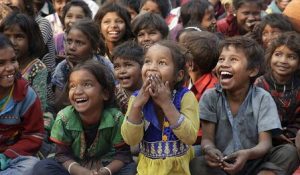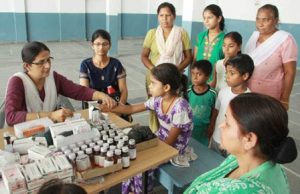CBOs Struggle Amidst Disaster Response
Although Civil Society Organisations (CSOs) are mentioned in Foreign Contribution Regulation Act (FCRA), they are being slaughtered as service delivery agents to remain enslaved.
Whenever there is any national crisis, be it manmade or natural, it is seen that organisations at the grassroots are the first to respond to it. Even with their resource constraints,  they have tried to give their best to deal with the calamities of any disaster as these organisations best know the ground realities. This time, the COVID-19 pandemic has brought to light the faults in the system, which have always been present, but were not visible. One of the major system flaws that have come to light was that of funding.
they have tried to give their best to deal with the calamities of any disaster as these organisations best know the ground realities. This time, the COVID-19 pandemic has brought to light the faults in the system, which have always been present, but were not visible. One of the major system flaws that have come to light was that of funding.
In a study conducted by Praxis and Partners in Change during the nationwide lockdown, 82 organisations, working in 13 states were approached to find out how they were placed, the status of relief and how they are financially capacitated. These organisations employed 8346 people who worked in 9394 villages and had supported 52 lakh community members through direct relief and many a timereferredthem to appropriate authority or organisations. The big highlight was that 83 per cent of these organisations were in fear of the survival due to the lockdown. Most of these organisations were from Odisha, Uttar Pradesh, Jharkhand, and Chhattisgarh working with marginalised communities, Dalits, Adivasi, minorities, de-notified tribes (DNT) and differently abled people. Of the 82 organisations, only one reported some sort of sustainability for the next three years.
In terms of supporting relief, almost every organisation was trying to do something or the other in the best of their capacities.They went to the extent of using their existing resources to help the communities. 48 per cent of them have gone for pay-cuts already. Due to lack of income 52 per cent of the organisations had applied for relief through proposals and various other means and 28 per cent did not get any fund from anybody for the relief work. Of the 59 organisations which got fund, half of them received relief fund through intermediary donor NGOs, individual volunteers and donors.
While the others received support from Corporate Social Responsibility (CSR), only a handful received funds from the government. Such was the severe condition of the backbone of the development sector.
Also Read : Land Rights as Human Rights: Asian CSOs Embark on Land Conflict Monitoring Initiative
Bringing forward direct voices from Community Based Organisations (CBOs), Praxis along with Partners in Change, National Alliance Group for Denotified Tribes and Solidarity Foundation organised a webinar with a range of panelists, who were representatives of frontline organisations. One of them was Karunanithi who has been working with HIV+ people in Tamil Nadu since 1999. He shared that in his 27 years of experience he had strived to reduce the stigma and discrimination in the community against HIV+ people and had also provided the infected people various opportunities to make them economically self dependent. Although he had received a lot of support from agencies like CBC, US Aid Fund and several other donors, but somehow after 2010 the issue lost its importance. “The donors have other options to provide funding to a big organisation that works in multiple areas. But the CBO working for HIV has no options as funding is the only form of support. With the reduction in donor support, the stigma has increased. The CBO requires support from donors as they are working directly with the HIV infected and affected persons”, Karunanithi shared.
Laila, President of Telangana Hijra Transgender Samiti, who is also working with HIV+ persons, transgenders and sex workers for their rights, health credential and social entitlements in the Warangal District shared that after COVID-19, 1600 trans-women in her organisation who were dependent on begging in trains for their livelihood were now struggling to have a two-time meal. “With the entire stigma present around trans-persons in the community, there was a question of who would support them. Initially, after the lockdown, we had approached many individual donors but we did not receive much support from them. The Telangana state government was able to extend support to a few trans-persons if not for all”, she shared. With the little support she was only able to support temporarily the hunger of the transgender community but theirstruggles were beyond that. They requiredsupport with paying their rents, covering medical expenses, partner violence and supporting families that were dependent on them. “Even though we have approached the donors we haven’t received funding from any organisation. As we are at the district level, we were also unable to approach bigger organizations or any funding”, Laila added.
The other major challenge that a CBO faces is lack of promotion and recognition in the larger frame. Especially if a CBO is from the grassroots, the road to sustainability becomes a long and hard one. Similar was the experience of Bimala Bardhan working for the Dalit community in Odisha.“Though we have the dedication to work but it is  getting difficult to continue. Older and elder organisations are given priority and we are completely ignored by the government too. We don’t have any fund to work for the community development and continue with our projects”, she shared.Even though COVID has brought forward several challenges for everyone, the hate, biasness and rumors against marginalized communities added to the friction. This is what Azhar Ali faced as he tried to help 15,000 Muslim families of Baliya after the fake news against Muslim community went viral. But that didn’t stop him to dream of a society which provides support to socially excluded communities to the best of capabilities. Through his efforts he got the support of Small Industries Development Bank of India (SIDBI) to help 500 Muslim families in Lucknow. “The fake news and rumors that were spread related to Muslims spreading COVID was one of the major challenges. During March we were at the closing session, hence we utilized whatever money was left with us. Now the challenge that remain is how to keep our staff going and help our community”, he said.
getting difficult to continue. Older and elder organisations are given priority and we are completely ignored by the government too. We don’t have any fund to work for the community development and continue with our projects”, she shared.Even though COVID has brought forward several challenges for everyone, the hate, biasness and rumors against marginalized communities added to the friction. This is what Azhar Ali faced as he tried to help 15,000 Muslim families of Baliya after the fake news against Muslim community went viral. But that didn’t stop him to dream of a society which provides support to socially excluded communities to the best of capabilities. Through his efforts he got the support of Small Industries Development Bank of India (SIDBI) to help 500 Muslim families in Lucknow. “The fake news and rumors that were spread related to Muslims spreading COVID was one of the major challenges. During March we were at the closing session, hence we utilized whatever money was left with us. Now the challenge that remain is how to keep our staff going and help our community”, he said.
Apart from lack of recognition, accumulating funds further becomes a bigger challenge for CBOs because of the dominant use of English language to write proposals.
Also Read : COVID-19 and Lockdown: Double Whammy for Children with Special Needs
Being at the community level many CBOs often don’t have the knowledge, skills or comfort to mention their requirements in the desired format or way.
Fortunately, in these testing times, unprecedented response in the form of philanthropy has seen a rise. Thousands of crores have been collected by the organised philanthropy of Prime Minister’s PM Cares fund and from various CSRs, citizen groups, middle class and high net worth individuals. Everybody responded in some form or the other which raised online funding by 180 per cent. According to Ingrid Srinath, Director of the Centre for Social Impact and Philanthropy at Ashoka University, there is now more consciousness in philanthropy. Philanthropists understand that CBOs are the best channels for support when it comes to building community resilience as a defense mechanism during crisis of all kinds. “They understand it is not only important to fund programmes but building those institutions so that they can respond whenever necessary. So, there is some shift”, she said. Having said that, due to the pandemic, the future of funding still appeared extremely bleak. There was an estimated 50 per cent drop in CSR funding and 25-30 per cent drop in individual funding. “Core programmes will have difficulty finding support and this is not only true for grassroots organisations, but larger organisations in the country are also struggling for funding. On a rough estimate 2 million staff members might find themselves unemployed by the end of this year”, she added. Sadly, NGOs as a sector are paying a high price in India for not having a well-developed ecosystem as compared to the other countries. Even in countries where support to civil societies was least expected, like Russia and China, they too were providing income support, tax incentives and other kind of support to the civil societies. However, this is not the case with the civil societies in India.
